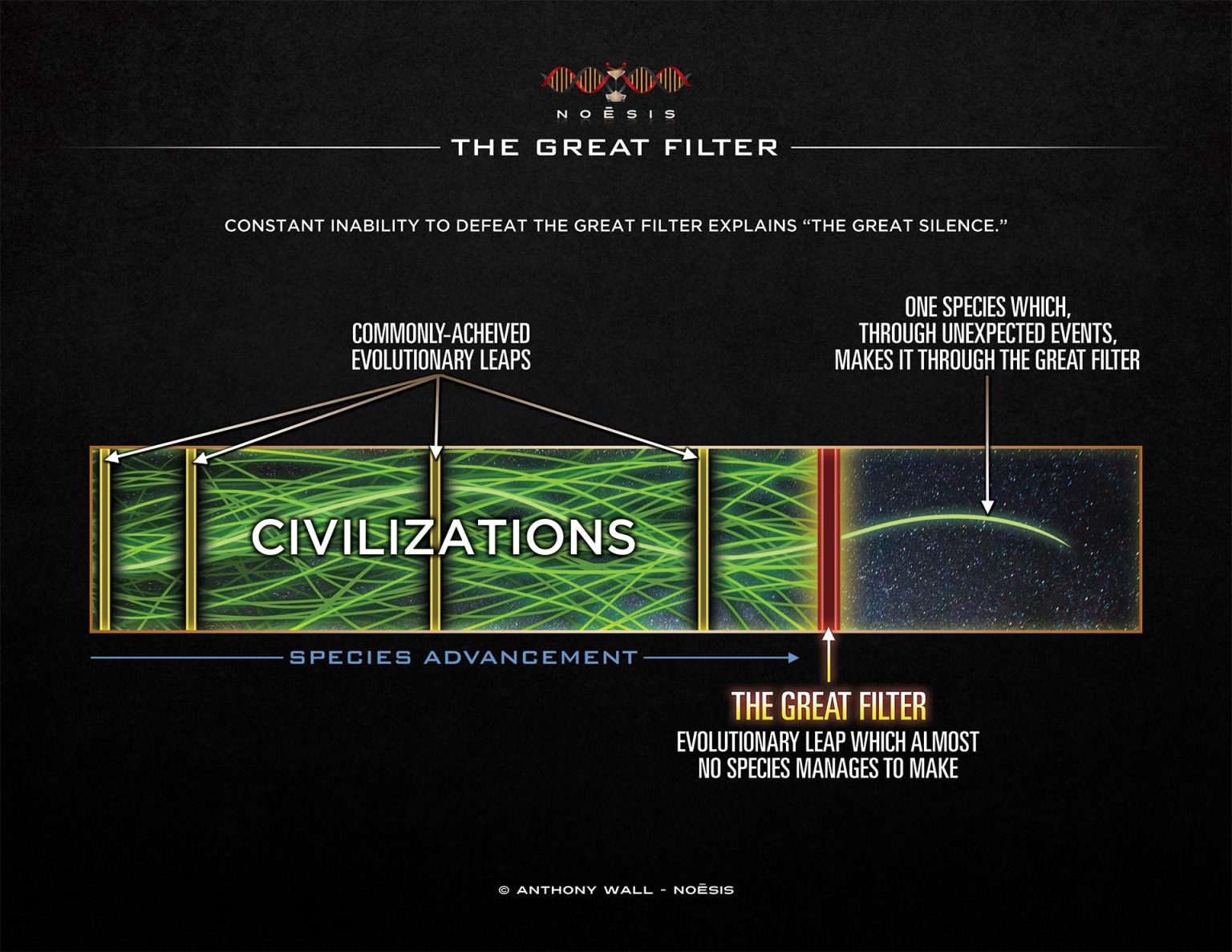In the vast expanse of the universe, where stars are born and die, and galaxies drift like whispered secrets in the dark, one question looms larger than the celestial bodies themselves: Are we alone? The Great Filter theory offers a tantalizing framework to explore this cosmic enigma, suggesting that somewhere along the evolutionary pathway, there exists a monumental barrier that prevents civilizations from advancing to a stage of interstellar communication or travel. Is this filter a harbinger of doom, a rite of passage, or perhaps a yet-to-be-discovered step in our own journey? As we peer deep into the cosmos and reflect on our place within it, we are compelled to dissect the implications of this theory—its potentialities, its mysteries, and the haunting reality it may unveil about our own existence. Join us as we embark on a journey through the intricate layers of the Great Filter, seeking to understand not just the universe, but ourselves.
Table of Contents
- Exploring the Great Filter Concept: A Journey Through Cosmic Possibilities
- Identifying Potential Filters: Biological, Technological, and Societal Challenges
- Implications for Humanity: Navigating Our Future in the Cosmic Landscape
- Strategies for Resilience: Ensuring Survival and Thriving Beyond the Filter
- Concluding Remarks
Exploring the Great Filter Concept: A Journey Through Cosmic Possibilities
The Great Filter theory presents a profound conundrum for humanity: why, despite the vastness of the universe, have we not encountered other intelligent civilizations? This enigma raises several possibilities regarding life’s trajectory, suggesting that somewhere along the timeline of the cosmos, there is a critical barrier that stifles intelligent life from advancing to the point of interstellar communication. Some possible filters could be biological, indicating that the leap from simple molecules to complex organisms is exceedingly rare. Others may be technological, implying that the development of advanced technology is often linked to self-destruction before a civilization can venture out into the stars.
As we unravel the implications of this theory, we are compelled to consider our own circumstances and the potential filters that lie ahead. Could humanity face existential threats such as nuclear war or climate change, which may stifle our progress? Alternatively, we might be fortunate enough to have already passed through the filter, raising questions about our responsibilities toward sustainability and the ethical use of technology. Below are some potential scenarios through which civilizations might falter or flourish:
| Scenario | Outcome |
|---|---|
| Over-exploitation of Resources | Collapse of civilization due to resource depletion |
| Technological Singularity | Humans merge with AI, leading to unforeseen advancements |
| Global Cooperation | Unified efforts to combat existential threats |
| Environmental Catastrophe | Inability to mitigate climate change leading to societal breakdown |
Identifying Potential Filters: Biological, Technological, and Societal Challenges
In the quest to unravel the Great Filter, potential barriers emerge across three pivotal domains: biological, technological, and societal. Biological challenges may stem from the fundamental limits of life itself, where the evolution of intelligent beings could be stunted by unpredictable environmental changes or the emergence of catastrophic diseases. The terrifying reality is that Earth has experienced numerous extinction events; if intelligent life is rare, it might be an evolutionary fluke that is not easily replicated elsewhere in the universe. This raises important questions about the resilience of life and the thresholds that must be crossed to achieve interstellar civilization.
On the technological front, the development of advanced civilizations raises a host of uncertainties, such as the risk of self-destruction through our innovations. Humanity stands at a crossroads with emerging technologies, including artificial intelligence and biotechnology, which, if mishandled, could result in our obliteration. Furthermore, societal challenges contribute to the complexity of this equation. Factors like resource inequality, political strife, and cultural conflicts can inhibit collaborative efforts and stymie innovation. The following table encapsulates some of these potential filters that humanity may face:
| Domain | Potential Filters |
|---|---|
| Biological |
|
| Technological |
|
| Societal |
|
Implications for Humanity: Navigating Our Future in the Cosmic Landscape
As we delve deeper into the enigmatic realm of the universe, the implications for humanity become increasingly significant. Recognizing our place in the cosmic hierarchy may challenge our understanding of life itself. The potential existence of a Great Filter—a barrier preventing civilizations from progressing to an advanced state—poses existential questions. Humans must grapple with understanding the factors that have allowed us to transcend certain challenges and whether we have yet to encounter our ultimate hurdle. This introspection is essential, as it shapes our innovative endeavors and influences our sustainability practices. Factors to consider include:
- Technological Advancements: How can we leverage technology responsibly to avert potential threats?
- Social Progress: Are we nurturing a resilient society that can withstand future crises?
- Environmental Consciousness: How do we ensure our survival without depleting our planet’s resources?
The Great Filter theory also serves as both a cautionary tale and a beacon of hope. If we are past the filter, we must actively preserve our civilization against self-inflicted perils. Conversely, if we are yet to confront our most significant challenge, awareness is our greatest ally. Analyzing historical events can unveil patterns and inform our future strategies. A simplified look into the milestones of human advancement may reveal the positive trajectories we must maintain:
| Milestone | Year | Significance |
|---|---|---|
| Discovery of Fire | c. 1.7 million years ago | Energy use and social development |
| Invention of the Wheel | c. 3500 BC | Transportation and trade |
| Industrial Revolution | 18th Century | Mass production and urbanization |
| Digital Age | Late 20th Century | Information explosion and connectivity |
Strategies for Resilience: Ensuring Survival and Thriving Beyond the Filter
As we confront the challenges posed by the Great Filter, it is crucial to adopt holistic strategies that foster resilience within society. These strategies should encompass not just survival but flourishing in the face of existential threats. Consider the following approaches:
- Education and Awareness: Cultivating a well-informed populace capable of grappling with complex issues surrounding survival and adaptation.
- Technological Innovation: Investing in breakthroughs that enhance sustainability, healthcare, and crisis management systems.
- Community Building: Fostering local and global networks that promote cooperation, resource sharing, and mutual support.
- Adaptive Governance: Developing flexible political frameworks that can respond effectively to emerging risks and challenges.
Moreover, focusing on emotional and psychological resilience is equally vital. Harnessing our collective mental strength will empower us to navigate uncertainties. To this end, initiatives could include:
| Strategy | Description |
| Mental Health Support | Providing accessible resources and counseling to foster individual and collective well-being. |
| Resilience Training | Implementing programs that teach skills for coping, adaptation, and thriving amid adversity. |
| Mindfulness Practices | Encouraging practices that enhance focus, emotional regulation, and stress management. |
Concluding Remarks
As we draw the curtains on our exploration of the Great Filter, we find ourselves suspended in a web of cosmic possibilities and profound questions. This enigmatic concept challenges us not only to ponder our place in the universe but also to reflect on the very essence of existence itself. Are we the lucky ones who have navigated the treacherous waters of evolutionary bottlenecks, or are we yet to face the ultimate hurdle that could seal our fate?
While the stars twinkle above, holding the secrets of countless worlds, the Great Filter serves as a reminder of both the fragility and resilience of life. As we gaze into the night sky, let us embrace the unknown with curiosity and caution, seeking knowledge while acknowledging our limitations. Each step we take toward understanding our cosmic conundrum may illuminate the path ahead—one that not only encompasses the survival of our species but also the legacy we leave for potential future civilizations.
In the vast expanse of the universe, the Great Filter compels us to act responsibly, ethically, and collaboratively, nurturing what we have and striving for a future that transcends our current understanding. As we continue to reach for the stars, perhaps the most profound discovery lies not just in unraveling the mysteries of existence, but in recognizing our interconnectedness within the great tapestry of life across the cosmos. Let us carry this awareness forward, fostering hope and vigilance in the face of the unknown, and embracing the journey of discovery that awaits us.


